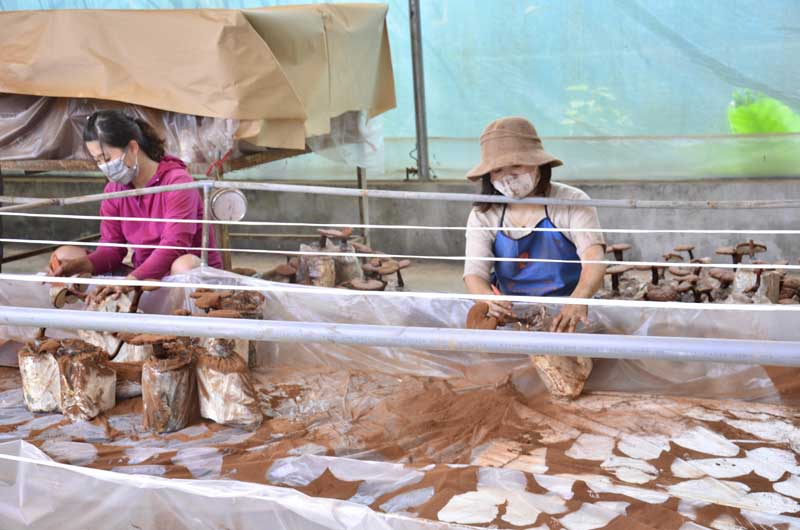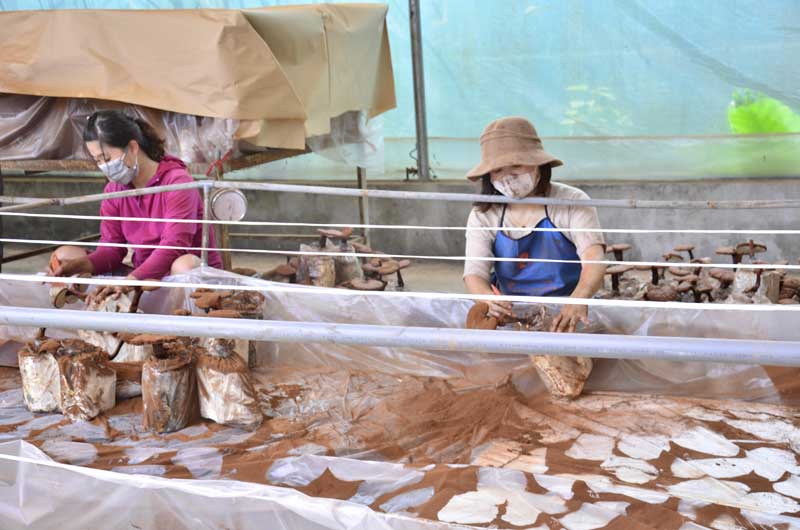
(HBO) - The red lingzhi mushroom grown on wood by the centre for scientific and technological advances application of Hoa Binh province was recently designated as a product of the local "One Commune, One Product” (OCOP) programme.
Staff
of Hoa Binh’s centre for scientific and technological advances application
harvest red lingzhi grown on substrate bags.
Earlier, the Department of Science and
Technology of Hoa Binh successfully conducted a research project on growing
lingzhi on fresh acacia wood and sawdust. The outcomes of this study were later
transferred to the province’s sci-tech application centre to further develop
and put into commercial production.
Unlike the popular method of cultivation of mushroom
on sawdust, the centre used a completely new technique that uses only fresh
acacia wood without any additives. Therefore, the quality of these lingzhi is
almost similar to those growing naturally.
To produce mushrooms that meet quality, size and
appearance standards, growers must adjust cultivation conditions according to
each development stage. When the light yellow caps turn brown, the mushrooms
are eligible for harvesting. At that time, each cap weighs about 200 grammes.
Each substrate bag can produce three harvests of
mushrooms. The first lingzhi can be picked in about three months, and the next
harvests in about 70 – 80 days.
By using the new technique, lingzhi prices can
be reduced to around 500,000 – 600,000 VND (21.6 – 25.9 USD) per kg, compared
to the current prices of up to several million VND per kg on the market.
With outstanding benefits for human health,
lingzhi mushrooms can be used as an ingredient of traditional medicine or as
tea for daily use. Tests have proved that lingzhi grown on fresh acacia wood
has high content of medicinal substances.
Therefore, farmers can grow lingzhi to supply
high-quality products with lower prices to consumers.
In the time ahead, the sci-tech application
centre will continue perfecting the mushroom tissue cultivating process and
developing the processing line to provide growing materials and create new
products like herbal tea and packaged lingzhi. This is expected to open up new
economic development chances and improve locals’ income./.
According to data from the Hoa Binh Provincial Party Committee, the industrial production index for the first six months of 2025 is estimated to have increased by 20% compared to the same period last year. This marks the highest year-on-year growth rate for this period since 2020.
In the first six months of 2025, Hoa Binh province’s export turnover was estimated at 1.145 billion USD, marking an 18.11% increase compared to the same period in 2024. Import turnover was estimated at $ 804 million, a 17.15% increase, which helped the province maintain a positive trade balance.
The lives of the ethnic minority farmers in Tan Lac district have gradually improved thanks to the new directions in agricultural production. This is a testament to the collective strength fostered through the professional associations and groups implemented by various levels of the district’s Farmers’ Union.
With the motto the "product quality comes first,” after nearly one year of establishment and operation, Muong village’s Clean Food Agricultural and Commercial Cooperative, located in Cau Hamlet, Hung Son Commune (Kim Boi district), has launched reputable, high-quality agricultural products to the market that are well-received by consumers. The products such as Muong village’s pork sausage, salt-cured chicken, and salt-cured pork hocks have gradually carved out a place in the market and they are on the path to obtaining the OCOP certification.
In the past, the phrase "bumper harvest, rock-bottom prices" was a familiar refrain for Vietnamese farmers engaged in fragmented, small-scale agriculture. But today, a new spirit is emerging across rural areas of Hoa Binh province - one of collaboration, organisation, and collective economic models that provide a stable foundation for production.
Maintaining growing area codes and packing facility codes in accordance with regulations is a mandatory requirement for agricultural products to be eligible for export. Recently, the Department of Agriculture and Environment of Hoa Binh province has intensified technical supervision of designated farming areas and packing facilities to safeguard the "green passport" that enables its products to access international markets.



